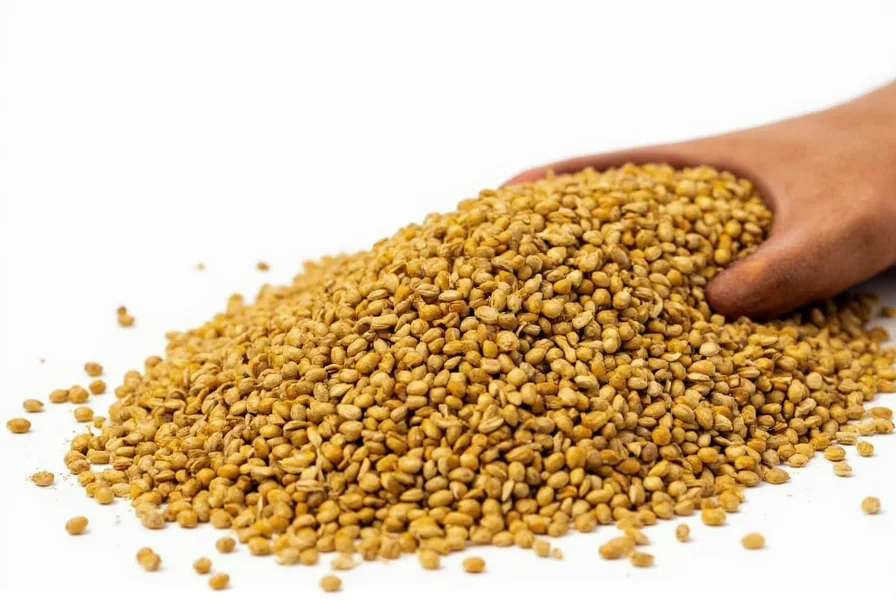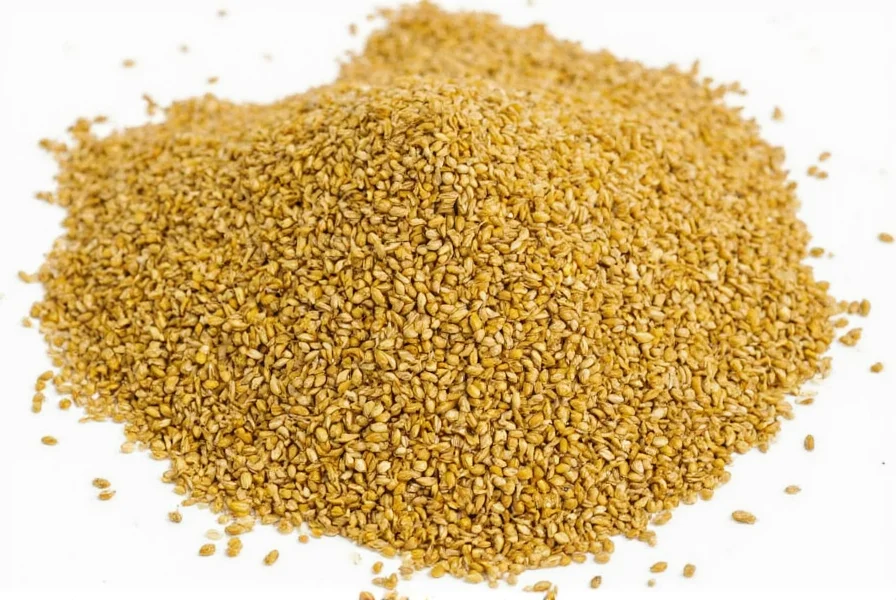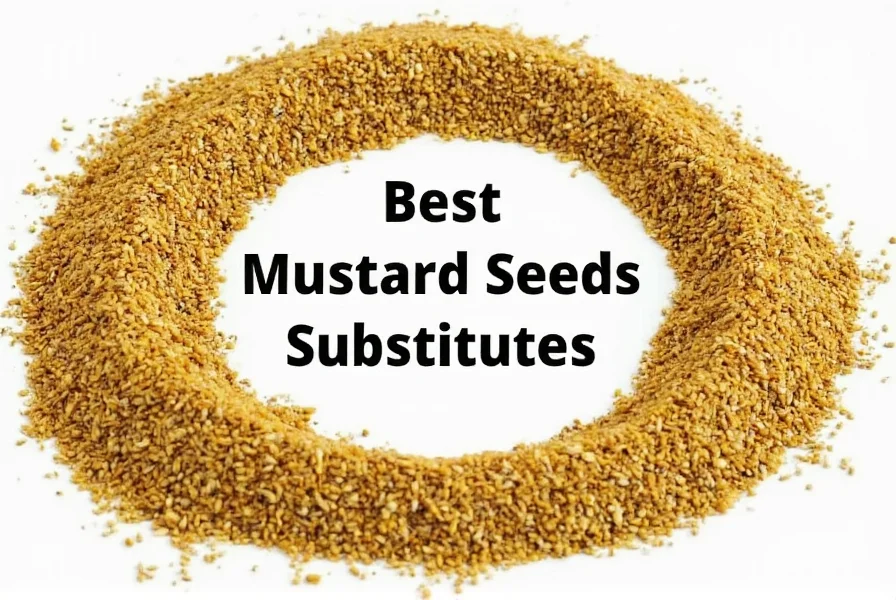Mustard seeds are a staple in many global cuisines, from Indian curries to German sauerkraut. But what happens when your recipe calls for them and your pantry comes up empty? Whether you're dealing with an allergy, dietary restriction, or simply ran out, knowing effective mustard seed alternatives can save your dish. This guide provides practical, chef-tested substitutions that maintain flavor integrity while accommodating different culinary needs.
Understanding Mustard Seed Varieties and Their Roles
Before selecting a substitute, recognize that mustard seeds come in three primary varieties: yellow (mild), brown (medium heat), and black (most pungent). Each serves distinct purposes in cooking:
- Whole seeds provide texture and release flavor when tempered in hot oil
- Ground mustard delivers consistent flavor throughout a dish
- Mustard paste offers tangy complexity in marinades and dressings
Effective substitution requires matching both the functional role and flavor profile in your specific recipe. A replacement that works for pickling won't necessarily suit an Indian tadka (tempering).

Top Mustard Seed Substitutes by Culinary Application
Not all substitutes work equally well across different cooking methods. Consider these targeted alternatives based on your specific need:
| Substitute | Best For | Conversion Ratio | Flavor Notes |
|---|---|---|---|
| Mustard powder | Sauces, dressings, marinades | 1 tsp powder = 1 tbsp seeds | Milder heat, consistent flavor distribution |
| Horseradish | Pickling, sandwiches, meat dishes | 1 tbsp prepared = 1 tbsp seeds | Sharper heat, different flavor profile |
| Wasabi paste | Asian-inspired dishes | 1/2 tsp wasabi = 1 tbsp seeds | Distinctive wasabi flavor, use sparingly |
| Fennel seeds | Vegetable dishes, breads | 1:1 replacement | Sweet licorice notes, less pungent |
| Vinegar + spices | When seeds are for acidity | 1 tbsp vinegar + pinch of turmeric | Provides tang without seed texture |
Specialized Substitutions for Specific Cuisines
Different culinary traditions use mustard seeds in unique ways, requiring tailored replacements:
For Indian Cooking
When replacing mustard seeds in South Asian recipes, particularly for tempering (tadka):
- Mustard powder alternative: Mix 1 teaspoon mustard powder with 2 teaspoons water to form a paste. Add during the tempering stage after heating oil.
- Whole seed replacement: Fennel seeds work well in vegetable dishes, while cumin seeds provide earthiness in dals. Use equal parts.
- For Bengali cuisine: Nigella seeds (kalonji) offer similar visual appeal and complementary flavor in many dishes.
For Pickling and Preserving
Mustard seeds contribute both flavor and preservative qualities in pickling. When substituting:
- Mustard powder works well but may cloud brine slightly
- Horseradish provides similar antimicrobial properties
- For white wine vinegar-based pickles, add 1/4 teaspoon turmeric for color
- Pro tip: For best results in mustard seed replacement for pickling cucumbers, combine 1 tablespoon mustard powder with 1 teaspoon celery seeds

When Substitutions Fall Short
While these alternatives work well in most cases, recognize situations where mustard seeds are irreplaceable:
- Authentic Dijon mustard production - Requires specific black/brown mustard seeds
- Certain regional Indian breads like Kasundi where seed texture is essential
- Traditional sauerkraut recipes where seeds contribute to fermentation
In these cases, consider modifying your recipe rather than forcing a substitution. For those with mustard allergies, consult a food allergist before attempting any substitutions that might contain cross-contaminants.
Expert Tips for Successful Substitution
Professional chefs recommend these techniques when replacing mustard seeds in recipes:
- Timing matters: Add powdered substitutes later in cooking than whole seeds to prevent bitterness
- Bloom spices: For mustard powder, mix with cold liquid first before adding to hot dishes
- Adjust acidity: Mustard provides tang - balance with lemon juice or vinegar if needed
- Texture compensation: When substituting powder for whole seeds, add sesame seeds for visual texture
Remember that successful substitution depends on understanding why mustard seeds are in your recipe. Is it for heat? Tang? Texture? Visual appeal? Identifying the primary function helps select the most appropriate replacement.
Frequently Asked Questions
Can I use mustard powder instead of mustard seeds in pickling?
Yes, but with adjustments. Use 1 teaspoon mustard powder for every tablespoon of seeds. Since powder dissolves completely, it won't provide the same visual texture. For best results in mustard seed replacement for pickling cucumbers, combine the powder with 1 teaspoon celery seeds to maintain complexity. Add the powder during the brine preparation rather than at the end.
What's the best substitute for black mustard seeds in Indian cooking?
For authentic Indian recipes requiring black mustard seeds, brown mustard seeds are the closest substitute. If unavailable, use equal parts fennel seeds for vegetable dishes or cumin seeds for dals. For tempering (tadka), mix 1 teaspoon mustard powder with 2 teaspoons water to create a paste that approximates the flavor release of whole seeds when added to hot oil.
How do I replace mustard seeds if I have an allergy?
For mustard allergies, avoid all mustard varieties and related substitutes like horseradish or wasabi which may cause cross-reactions. Instead, use a combination of vinegar (for tang) and other seeds like fennel or cumin (for texture). In salad dressings, replace with tahini-based sauces. Always consult an allergist before trying substitutions if you have a confirmed mustard allergy.
Can I skip mustard seeds entirely in a recipe?
You can omit mustard seeds, but the dish will lack their distinctive flavor and functional properties. In most cases, the recipe will still work but with diminished complexity. For better results when replacing mustard seeds in recipes, add 1/4 teaspoon turmeric for color and 1 teaspoon vinegar for tang. In spice-heavy dishes like curries, consider increasing other spices by 10-15% to compensate for the missing flavor dimension.











 浙公网安备
33010002000092号
浙公网安备
33010002000092号 浙B2-20120091-4
浙B2-20120091-4